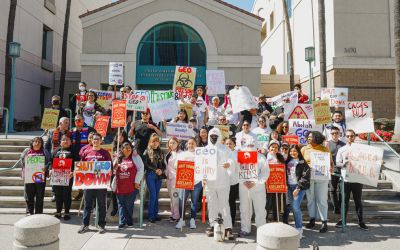 Founded in 2008 by Roman Catholic Auxiliary Bishop Rutilio del Riego, Inland Coalition for Immigrant Justice (ICIJ) was first convened to unify immigrant leaders in the Inland Empire. If faith-based, grassroots, and community organizations worked as a coalition, he believed that there could be a unified message of justice for immigrants. He also believed that all organizations could better pursue justice and change in their communities.
Founded in 2008 by Roman Catholic Auxiliary Bishop Rutilio del Riego, Inland Coalition for Immigrant Justice (ICIJ) was first convened to unify immigrant leaders in the Inland Empire. If faith-based, grassroots, and community organizations worked as a coalition, he believed that there could be a unified message of justice for immigrants. He also believed that all organizations could better pursue justice and change in their communities.
Today, the coalition is comprised of 35 organizations that work together to ensure there is equity and representation in services provided to all members of the community. One in every five people living in the Inland Empire region are immigrants, according to Javier Hernandez, the coalition’s executive director. ICIJ reaches 100,000 people a year with resources that are available to them and serves as a trusted messenger and partner.
The ability to reach the immigrant community and amplify the message of their needs is important to building up a thriving region and particularly important in challenging times such as the COVID-19 pandemic, Hernandez said.
“When we think about the immigrant community, we think it is people who are just arriving, but a lot of these people have been here 10 or 20 years,” he said. “They are our family members, friends and neighbors.”
The coalition works to ensure that the immigrant community is integrated in such a way that they have opportunities to start their own business and can access preventative health care. ICIJ feels that these individuals are already a part of the fabric of the community and that when they are fully immersed in society, this helps create and support small businesses, and creates healthier, safer and thriving communities.
ICIJ has advocated for immigrant access to health care and driver’s licenses, which are now available to immigrants in the state of California. The coalition is currently advocating for Safety Net for All which would provide unemployment benefits to undocumented workers. While employers pay into the state’s unemployment insurance trust fund on behalf of these workers, employees are unable to access these funds. The impact of this can be particularly devastating during a state-wide crisis, according to ICIJ.
“It hurt our communities’ ability to survive financially during the pandemic,” Hernandez said. “During COVID, millions of people lost their jobs and immigrant families were hit the hardest.”
Recently, ICIJ received a grant from the CIELO Fund through the Inland Empire Community Foundation for its work supporting street vendors. Street vending became very popular during the pandemic when many workers had no other source of income. ICIJ worked with cities and counties to assist vendors seeking permits. The coalition also helped vendors receive food handling courses, necessary certifications, pull additional permits for events and provided small grants for vendors to invest in the appropriate equipment for vending at farmer’s markets and events.
Two of the vendors ICIJ assisted during the pandemic leaned into their entrepreneurial spirit and now have brick-and-mortar shops where they serve food. The coalition is continuing this work and is advocating for the City of San Bernardino to pass policies that support street vending and are positive for the community.
Hernandez understands that immigration is a controversial topic but hopes that the community can embrace creating a region that is equitable for everyone.
“We want to lift the whole community,” he said. “We should ensure that everyone has access to services and can give back to our community as well. We want everyone to live a healthy life and that includes immigrants.”
More information: https://ic4ij.org/ or 909-652-0214
This story originally appeared in the Press Enterprise, April 2023.
Learn more about the good work we’re doing at IECF through the power of philanthropy. Subscribe to our free monthly eNewsletter, Philanthropy Matters.


